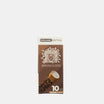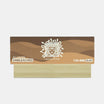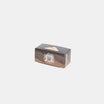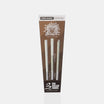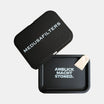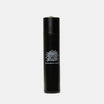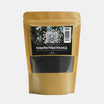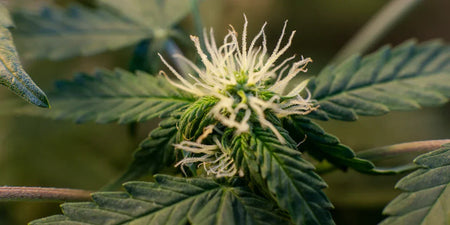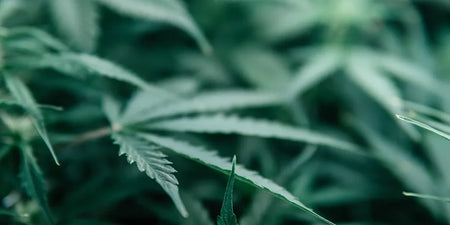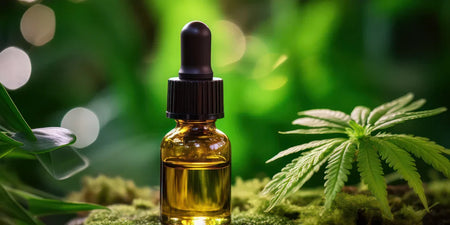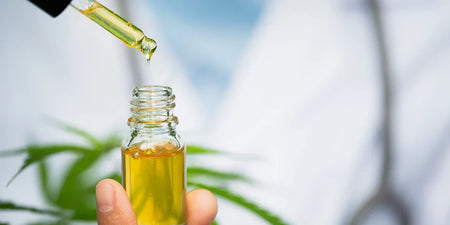HHC - What you need to know about the effects of hexahydrocannabinol
The most important thing on the topic
How does HHC work?
HHC is a newer cannabinoid whose effects have not yet been fully researched. Find out more about the current state of research in this section.
Read moreLegal position of HHC
The legal situation of HHC in Germany and beyond has changed quite significantly over the last few years. Check out this section for more information.
Read moreWhat is behind the cannabinoid HHC?
Hexahydrocannabinol (HHC) is a newer substance in the cannabis field that is produced by hydrogenating Δ8-THC or Δ9-THC with hydrogen and metal catalysts [1]. Roger Adams was the first to successfully produce HHC in 1947 by synthesizing naturally occurring THC. In addition, several research groups have also synthesized HHC stereoselectively from other sources such as citronellal, olivetol and similar compounds [2]. To date, only little information is known about HHC as an active ingredient. In contrast to THC and CBD, which are of natural origin, HHC is usually produced synthetically.
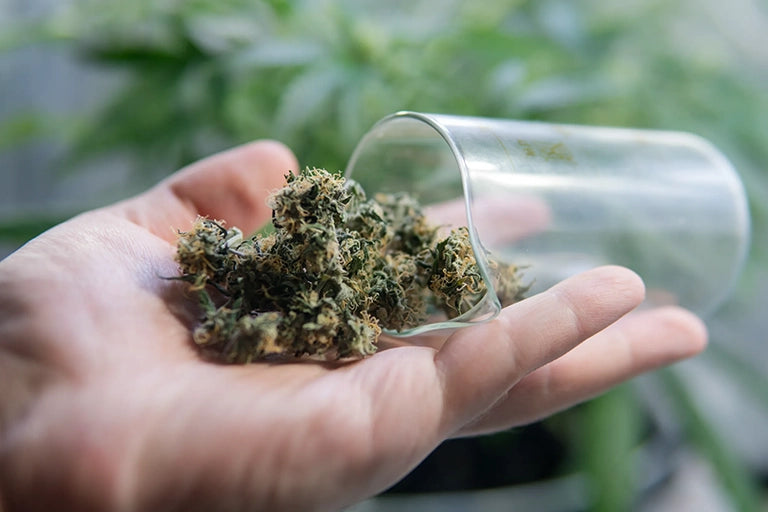
Our joint accessories
HHC flowers
HHC flowers - also known as HHC Weed - are similar to traditional cannabis flowers in their morphological nature, but differ in their HHC content. These flowers offer a different cannabinoid profile than flowers containing THC or CBD. Although HHC is naturally present in small amounts in the cannabis plant, CBD is often used as the base substance for the production of HHC.
How does HHC work?
Scientific research on HHC is still in its early stages, and there is limited information about the specific effects of this cannabinoid. A study in the journal Current Neuropharmacolog found that HHC exhibits typical cannabinoid effects on the central nervous system, but with lower potency than Δ9-THC. HHC was observed to have an affinity for the CB1 receptor both in vitro and in vivo, suggesting possible therapeutic potential in various pathologies. At the same time, it was pointed out that this affinity for the CB1 receptor also harbors a possible addiction potential, which could lead to abuse [3].
Due to limited scientific data, it is important to be cautious in making assumptions about the potential effects of HHC products on health or well-being. As with other cannabinoids, the effects of HHC can vary from person to person, depending on factors such as individual physiology, dose and method of administration.
Difference THC vs HHC
THC is probably the most well-known psychoactive cannabinoid that occurs naturally in the cannabis plant. A study in the journal adicciones highlights that Δ-9-tetrahydrocannabinol (THC) contributes the most to cannabis psychoactivity [4]. THC interacts primarily with the CB1 receptors in the brain, resulting in its characteristic effects.
HHC, on the other hand, is a mostly artificially produced cannabinoid that is created by hydrogenating THC. In this process, hydrogen atoms are bonded to the THC molecule, resulting in a change in its chemical structure. This modification may affect the way HHC interacts with the body's cannabinoid receptors.
Another key difference between THC and HHC lies in their legal classification and availability. While THC is classified as a controlled substance in some countries, HHC exists in a legal gray area depending on the country as it is a newer cannabinoid and its legal provisions are often less clearly defined.
In conclusion, THC and HHC have significantly different profiles in terms of their origin, chemical structure, effects and legal treatment. While THC has been extensively researched, scientific research on HHC is still in its early stages.
Difference CBD vs HHC
CBD is a naturally occurring cannabinoid in the cannabis plant and is known for its non-psychoactive properties [5]. HHC, on the other hand, is a mostly artificially produced cannabinoid that is obtained by modifying THC. The hydrogenation of THC, which involves the addition of hydrogen atoms, results in the formation of HHC. This chemical conversion could change the way HHC interacts with cannabinoid receptors in the body, resulting in different effects.
An important aspect when comparing CBD and HHC is their legal classification and availability. While CBD is legal in many countries and is widely used as a dietary supplement or in cosmetic products, HHC is often in a legal gray area because it is a new and less researched cannabinoid.
You can also use our products for CBD joints and CBD cigarettes
Legal position of HHC
HHC does not currently appear in Germany's Narcotics Act (BtMG). In addition to the BtMG, the “New Psychoactive Substances Act” has been in place since 2016, which includes the substance groups of all synthetic cannabimimetics. Some producers assume that the "semi-synthetic" HHC does not fall under the "New Psychoactive Substances Act" (NpSG) because it can often be certified as "naturally produced" by expert opinion. Due to this legal loophole, the substance is currently sold freely [6]. In other countries, such as Austria, the production and trade of HHC is prohibited [7].
You can find out more about CBD here
Further questions
In some countries the production and trade of HHC is prohibited. HHC does not currently appear in Germany's Narcotics Act (BtMG), which is why many dealers take advantage of this situation to sell HHC.
A 1991 study by Harvey and Brown showed that HHC is metabolized similarly to THC. However, there is no clear scientific evidence supporting the detectability of HHC in drug tests [8]
HHC is currently available for consumption in several ways [9]: Vaping or smoking : HHC may be available in the form of vape cartridges or as flower for smoking. Edibles : HHC may be available in edible form, such as gummy bears or other snacks. Oils and Tinctures : There are HHC oils and HHC in drinks and foods. Capsules and Pills : HHC comes in capsule form. Topical Uses : HHC may also be included in select HHC creams and ointments for external use. It is important to note that the effects and safety of HHC have not yet been fully researched. Therefore, you should exercise caution when using it and inform yourself about the legislation in the respective country or state.
Sources:
[1] https://forgehemp.com/wp-content/uploads/2022/03/Analysis-of-Hexahydrocannabinols-280222.pdf
[2] https://pubs.acs.org/doi/10.1021/acs.joc.9b02962
[3] https://pubmed.ncbi.nlm.nih.gov/37357519/
[4] https://pubmed.ncbi.nlm.nih.gov/28492950/
[5] https://pubmed.ncbi.nlm.nih.gov/21827451/#:~:text=%23++Cannabidiol%2C+a+non,in+the+dorsal+raphe+nucleus
[6] https://www.rbb24.de/panorama/teil/2023/02/berlin-cannabis-hhc-spaeti-verbrauch-legal-markt-thc.html
[7] http://www.drogentest-wien.at/info/hexahydrocannabinol#:~:text=possession+and+consumption+of+HHC,HHC%2Dproducts+in+the+EU.
[8] https://cfah.org/does-hhc-show-up-on-a-drug-test/
[9] https://gemfive.com/different-ways-to-consume-hhc-vaping-edibles-tinctures-and-more/






